鲁教版(五四制)七年级上册Unit 5 Where did you go on vacation? Section A Grammar Focus~3c课件(共19张PPT)
文档属性
| 名称 | 鲁教版(五四制)七年级上册Unit 5 Where did you go on vacation? Section A Grammar Focus~3c课件(共19张PPT) |
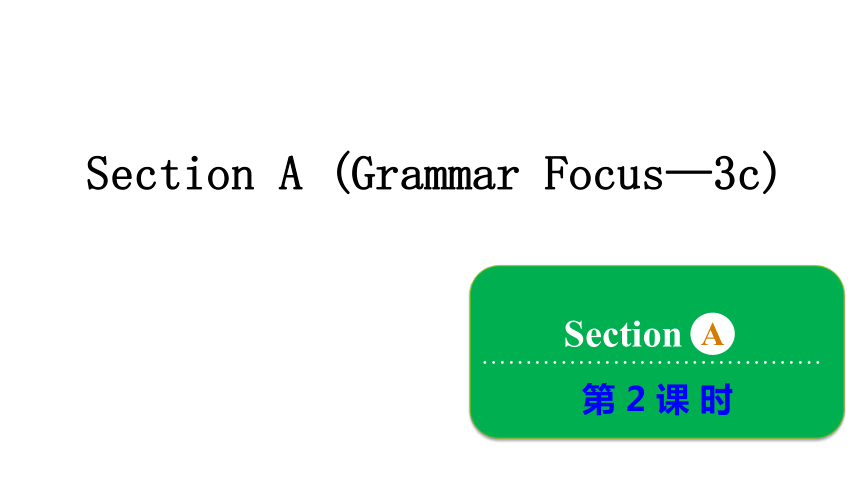
|
|
| 格式 | pptx | ||
| 文件大小 | 325.4KB | ||
| 资源类型 | 教案 | ||
| 版本资源 | 鲁教版 | ||
| 科目 | 英语 | ||
| 更新时间 | 2024-05-03 00:00:00 | ||
图片预览

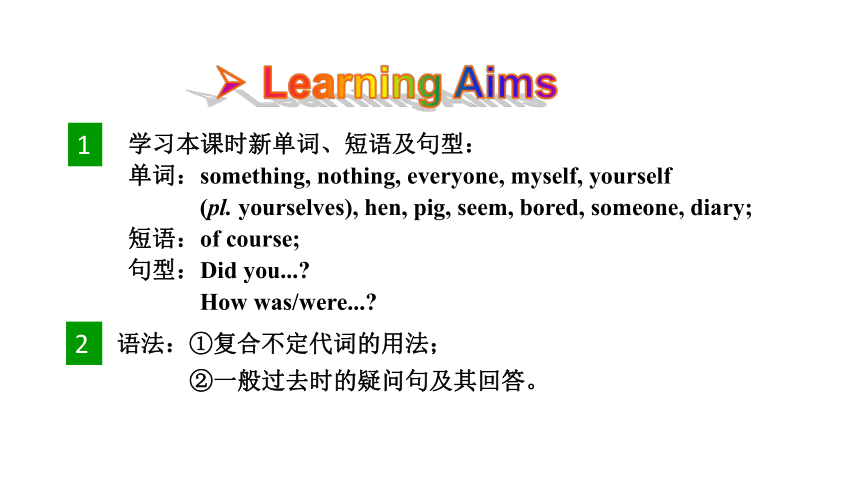
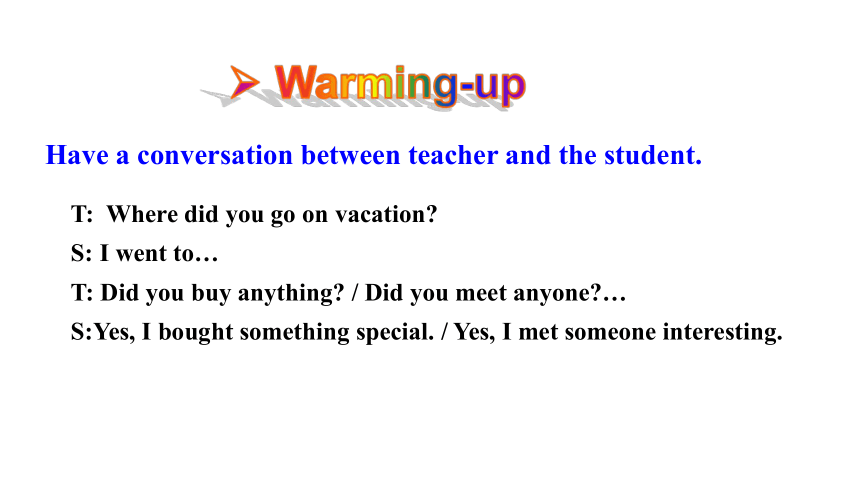
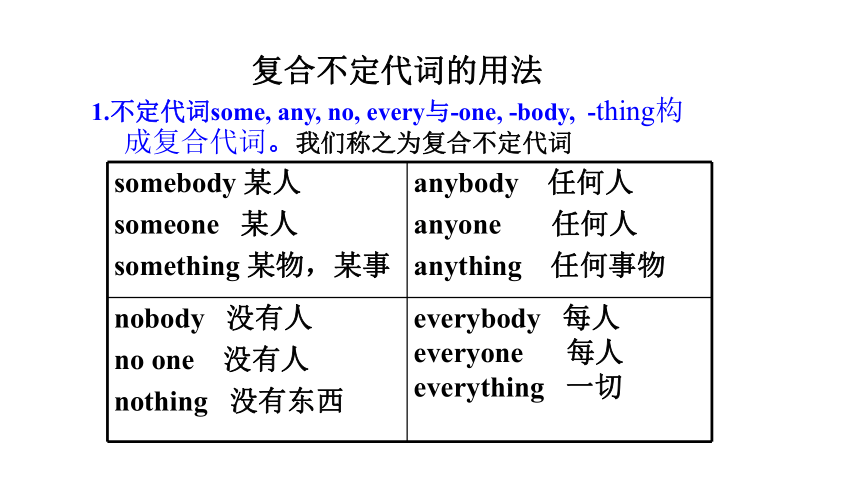
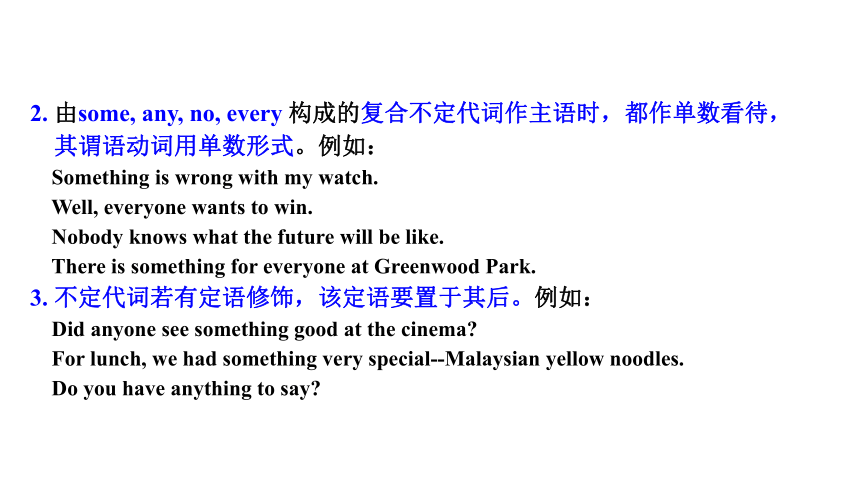
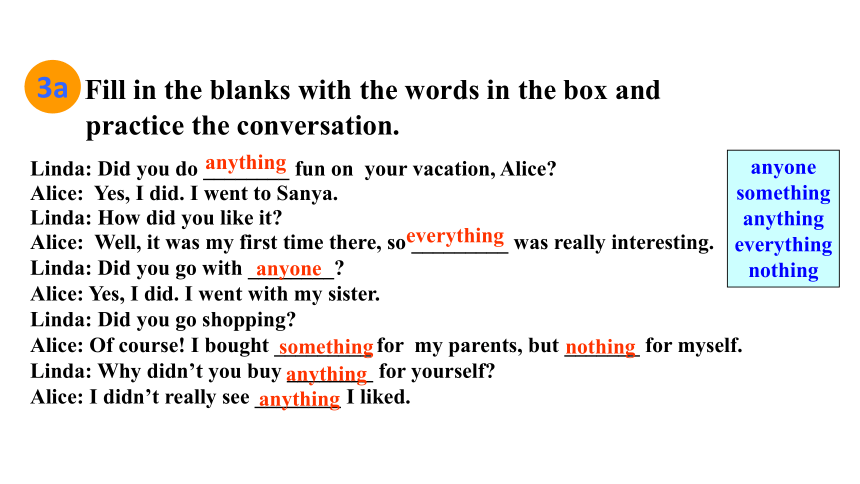
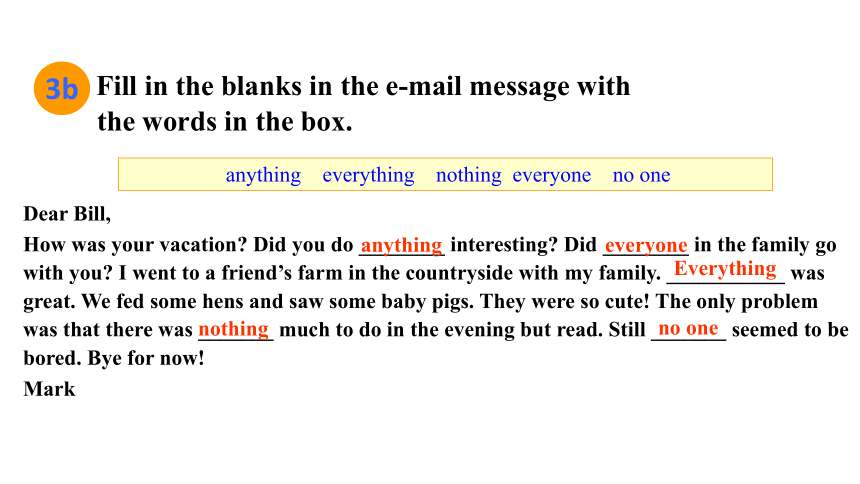
文档简介
(共19张PPT)
Section
Section A (Grammar Focus—3c)
第 2 课 时
…………………………………
A
Learning Aims
学习本课时新单词、短语及句型:
单词:something, nothing, everyone, myself, yourself
(pl. yourselves), hen, pig, seem, bored, someone, diary;
短语:of course;
句型:Did you...
How was/were...
1
语法:①复合不定代词的用法;
②一般过去时的疑问句及其回答。
2
Have a conversation between teacher and the student.
T: Where did you go on vacation
S: I went to…
T: Did you buy anything / Did you meet anyone …
S:Yes, I bought something special. / Yes, I met someone interesting.
Warming-up
somebody 某人 someone 某人 something 某物,某事 anybody 任何人
anyone 任何人
anything 任何事物
nobody 没有人 no one 没有人 nothing 没有东西 everybody 每人everyone 每人everything 一切
复合不定代词的用法
1.不定代词some, any, no, every与-one, -body, -thing构成复合代词。我们称之为复合不定代词
2. 由some, any, no, every 构成的复合不定代词作主语时,都作单数看待,
其谓语动词用单数形式。例如:
Something is wrong with my watch.
Well, everyone wants to win.
Nobody knows what the future will be like.
There is something for everyone at Greenwood Park.
3. 不定代词若有定语修饰,该定语要置于其后。例如:
Did anyone see something good at the cinema
For lunch, we had something very special--Malaysian yellow noodles.
Do you have anything to say
Fill in the blanks with the words in the box and
practice the conversation.
Linda: Did you do ________ fun on your vacation, Alice
Alice: Yes, I did. I went to Sanya.
Linda: How did you like it
Alice: Well, it was my first time there, so _________ was really interesting.
Linda: Did you go with ________
Alice: Yes, I did. I went with my sister.
Linda: Did you go shopping
Alice: Of course! I bought _________ for my parents, but _______ for myself.
Linda: Why didn’t you buy ________ for yourself
Alice: I didn’t really see ________ I liked.
anyone
something
anything
everything
nothing
anything
everything
anyone
something
nothing
anything
anything
3a
Fill in the blanks in the e-mail message with
the words in the box.
anything everything nothing everyone no one
Dear Bill,
How was your vacation Did you do ________ interesting Did ________ in the family go with you I went to a friend’s farm in the countryside with my family. ___________ was great. We fed some hens and saw some baby pigs. They were so cute! The only problem was that there was _______ much to do in the evening but read. Still _______ seemed to be bored. Bye for now!
Mark
anything
everyone
Everything
nothing
no one
3b
Did you… Everyone Someone(write the classmate’s name) No one
eat anything at a restaurant
read anything interesting
visit anyone in your family
buy anything
keep a diary
Ask your group questions about their last vacation. Then tell the class your results.
3c
In our group,
everyone ate
something at a restaurant …
一般过去时
构成
用法
主语+动词的过去式
1. 表示过去某个时间发
生的动作或存在的状态。
2. 表示过去经常或反复
发生的动作。
(the day before) yesterday
last night / week
in 1990 / just now
On Sunday morning
two days ago…
常用时间状语
系动词be的过去时:
am /is → was
are →were
陈述句:He was at home yesterday.
否定句:He wasn’t at home yesterday.
疑问句:Was he at home yesterday
Yes, he was./ No, he wasn’t.
句子构成
行为动词的一般过去时:
陈述句:主语+动词过去式+其他
I go to the movies. →
否定句:主语+助动词didn’t+动词原形+其他
I don’t go to school today. →
一般疑问句:Did +主语+动词原形+其他
Do you have breakfast →
I went to the movies.
I didn’t go to school.
Did you have breakfast
Yes, I do./ No, I don’t.
Yes, I did./No, I didn’t.
Language points
How did you like it?你觉得那里怎么样?
“How do you like...?”意为“你认为……怎么样?”,主要用于询问对方对某事物或某人的看法,相当于“What do you think of...?”或“How do you feel about...?”。
【例】—How do you like the western food?
你觉得西餐怎么样?
—It tastes good. 味道不错。
2. Did you go with anyone?你和别人一起去的吗?
anyone 作代词,相当于 anybody,一般用于疑问句和否定句,代替 someone。
【例】 Is anyone in the office?有人在办公室吗?
【例】 Choose any one you like. 挑一个你喜欢的。
3. Still no one seemed to be bored. 然而没有人看起来烦闷。
(1) seem 意为“好像;似乎;看来”,后面可接动词不定式、名词或形容词等。“seem+(to be+)形容词/名词”意为“看起来……;好像……”。
【例】 They seemed(to be)very happy. 他们好像挺高兴。
【例】 Ann didn’t seem very sure. 安看起来并不十分肯定。
(2) bored 作形容词,意为“厌倦的;烦闷的”,说明人的感受。be bored with
意为“对……感到厌烦”。
【例】 Are you bored with the game?你对这次比赛感到厌烦吗?
1.复合不定代词及其用法
①复合不定代词的构成
②形容词修饰复合不定代词时要后置
③复合不定代词作主语时谓语动词用单数
2.一般过去时的疑问句及其回答
Summary
一、单项选择
1.Please keep quiet, ______! I have ______ to tell you.
A. everyone; anything important
B. anybody; something important
C. everyone; important everything
D. everyone; something important
2. —Do you love your parents?
—Yes, of course. ______ in my life is more important than them.
A. Something B. Anything C. Nothing D. Everything
Exercises
3. —How do you like the program Chinese Poetry Conference?
—I think it’s ______, but some people are ______ with it.
A. wonderful enough; bored B. enough wonderful; boring
C. wonderful enough; boring D. enough wonderful; bored
4. ______ went to the mountains last weekend ______ the bad weather.
A. Something; because B. No one; because of
C. No one; because D. Nothing; because of
二、按要求改写句子,每空一词。
1. Lucy did her homework at home.(改否定句)
Lucy didn’t do her homework at home.
2. He found some meat in the fridge(冰箱).(变一般疑问句)
Did he find any meat in the fridge
3. There was some orange in the cup.(变一般疑问句)
Was there any orange in the cup
4. Frank read an interesting book about history last week. (一般疑问句)
Did Frank read an interesting book about history last week
1. Remember the new words and expressions in
Grammar Focus-3c.
2. Preview Section B 1a-1e.
Homework
Section
Section A (Grammar Focus—3c)
第 2 课 时
…………………………………
A
Learning Aims
学习本课时新单词、短语及句型:
单词:something, nothing, everyone, myself, yourself
(pl. yourselves), hen, pig, seem, bored, someone, diary;
短语:of course;
句型:Did you...
How was/were...
1
语法:①复合不定代词的用法;
②一般过去时的疑问句及其回答。
2
Have a conversation between teacher and the student.
T: Where did you go on vacation
S: I went to…
T: Did you buy anything / Did you meet anyone …
S:Yes, I bought something special. / Yes, I met someone interesting.
Warming-up
somebody 某人 someone 某人 something 某物,某事 anybody 任何人
anyone 任何人
anything 任何事物
nobody 没有人 no one 没有人 nothing 没有东西 everybody 每人everyone 每人everything 一切
复合不定代词的用法
1.不定代词some, any, no, every与-one, -body, -thing构成复合代词。我们称之为复合不定代词
2. 由some, any, no, every 构成的复合不定代词作主语时,都作单数看待,
其谓语动词用单数形式。例如:
Something is wrong with my watch.
Well, everyone wants to win.
Nobody knows what the future will be like.
There is something for everyone at Greenwood Park.
3. 不定代词若有定语修饰,该定语要置于其后。例如:
Did anyone see something good at the cinema
For lunch, we had something very special--Malaysian yellow noodles.
Do you have anything to say
Fill in the blanks with the words in the box and
practice the conversation.
Linda: Did you do ________ fun on your vacation, Alice
Alice: Yes, I did. I went to Sanya.
Linda: How did you like it
Alice: Well, it was my first time there, so _________ was really interesting.
Linda: Did you go with ________
Alice: Yes, I did. I went with my sister.
Linda: Did you go shopping
Alice: Of course! I bought _________ for my parents, but _______ for myself.
Linda: Why didn’t you buy ________ for yourself
Alice: I didn’t really see ________ I liked.
anyone
something
anything
everything
nothing
anything
everything
anyone
something
nothing
anything
anything
3a
Fill in the blanks in the e-mail message with
the words in the box.
anything everything nothing everyone no one
Dear Bill,
How was your vacation Did you do ________ interesting Did ________ in the family go with you I went to a friend’s farm in the countryside with my family. ___________ was great. We fed some hens and saw some baby pigs. They were so cute! The only problem was that there was _______ much to do in the evening but read. Still _______ seemed to be bored. Bye for now!
Mark
anything
everyone
Everything
nothing
no one
3b
Did you… Everyone Someone(write the classmate’s name) No one
eat anything at a restaurant
read anything interesting
visit anyone in your family
buy anything
keep a diary
Ask your group questions about their last vacation. Then tell the class your results.
3c
In our group,
everyone ate
something at a restaurant …
一般过去时
构成
用法
主语+动词的过去式
1. 表示过去某个时间发
生的动作或存在的状态。
2. 表示过去经常或反复
发生的动作。
(the day before) yesterday
last night / week
in 1990 / just now
On Sunday morning
two days ago…
常用时间状语
系动词be的过去时:
am /is → was
are →were
陈述句:He was at home yesterday.
否定句:He wasn’t at home yesterday.
疑问句:Was he at home yesterday
Yes, he was./ No, he wasn’t.
句子构成
行为动词的一般过去时:
陈述句:主语+动词过去式+其他
I go to the movies. →
否定句:主语+助动词didn’t+动词原形+其他
I don’t go to school today. →
一般疑问句:Did +主语+动词原形+其他
Do you have breakfast →
I went to the movies.
I didn’t go to school.
Did you have breakfast
Yes, I do./ No, I don’t.
Yes, I did./No, I didn’t.
Language points
How did you like it?你觉得那里怎么样?
“How do you like...?”意为“你认为……怎么样?”,主要用于询问对方对某事物或某人的看法,相当于“What do you think of...?”或“How do you feel about...?”。
【例】—How do you like the western food?
你觉得西餐怎么样?
—It tastes good. 味道不错。
2. Did you go with anyone?你和别人一起去的吗?
anyone 作代词,相当于 anybody,一般用于疑问句和否定句,代替 someone。
【例】 Is anyone in the office?有人在办公室吗?
【例】 Choose any one you like. 挑一个你喜欢的。
3. Still no one seemed to be bored. 然而没有人看起来烦闷。
(1) seem 意为“好像;似乎;看来”,后面可接动词不定式、名词或形容词等。“seem+(to be+)形容词/名词”意为“看起来……;好像……”。
【例】 They seemed(to be)very happy. 他们好像挺高兴。
【例】 Ann didn’t seem very sure. 安看起来并不十分肯定。
(2) bored 作形容词,意为“厌倦的;烦闷的”,说明人的感受。be bored with
意为“对……感到厌烦”。
【例】 Are you bored with the game?你对这次比赛感到厌烦吗?
1.复合不定代词及其用法
①复合不定代词的构成
②形容词修饰复合不定代词时要后置
③复合不定代词作主语时谓语动词用单数
2.一般过去时的疑问句及其回答
Summary
一、单项选择
1.Please keep quiet, ______! I have ______ to tell you.
A. everyone; anything important
B. anybody; something important
C. everyone; important everything
D. everyone; something important
2. —Do you love your parents?
—Yes, of course. ______ in my life is more important than them.
A. Something B. Anything C. Nothing D. Everything
Exercises
3. —How do you like the program Chinese Poetry Conference?
—I think it’s ______, but some people are ______ with it.
A. wonderful enough; bored B. enough wonderful; boring
C. wonderful enough; boring D. enough wonderful; bored
4. ______ went to the mountains last weekend ______ the bad weather.
A. Something; because B. No one; because of
C. No one; because D. Nothing; because of
二、按要求改写句子,每空一词。
1. Lucy did her homework at home.(改否定句)
Lucy didn’t do her homework at home.
2. He found some meat in the fridge(冰箱).(变一般疑问句)
Did he find any meat in the fridge
3. There was some orange in the cup.(变一般疑问句)
Was there any orange in the cup
4. Frank read an interesting book about history last week. (一般疑问句)
Did Frank read an interesting book about history last week
1. Remember the new words and expressions in
Grammar Focus-3c.
2. Preview Section B 1a-1e.
Homework
同课章节目录
- Unit 1 What does he look like?
- Section A
- Section B
- Unit 2 I'd like some noodles.
- Section A
- Section B
- Unit 3 How was your school trip?
- Section A
- Section B
- Unit 4 What did you do last weekend?
- Section A
- Section B
- Unit 5 Where did you go on vacation?
- Section A
- Section B
- Unit 6 How often do you exercise?
- Section A
- Section B
- Unit 7 I'm more outgoing than my sister.
- Section A
- Section B
- Unit 8 What's the best movie theater?
- Section A
- Section B
